Unit 1 Where did you go on vacation Section B 课件(共31张PPT)
文档属性
| 名称 | Unit 1 Where did you go on vacation Section B 课件(共31张PPT) | 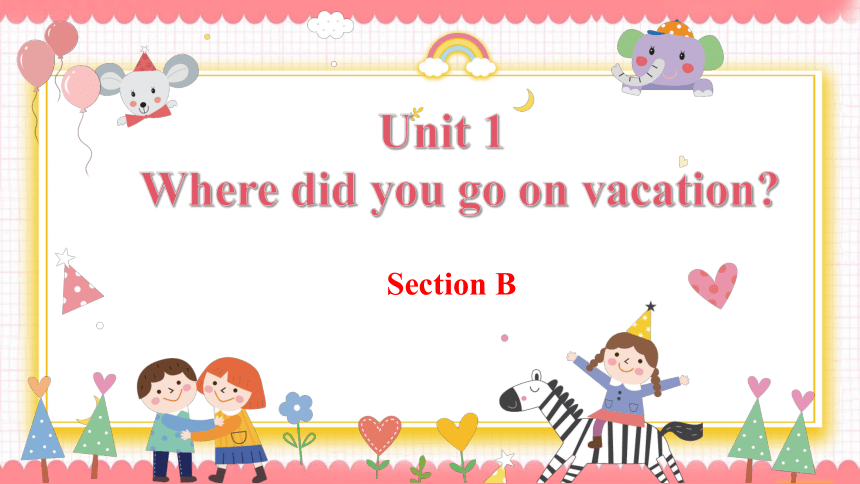 | |
| 格式 | pptx | ||
| 文件大小 | 6.3MB | ||
| 资源类型 | 教案 | ||
| 版本资源 | 人教新目标(Go for it)版 | ||
| 科目 | 英语 | ||
| 更新时间 | 2023-10-27 22:23:53 | ||
图片预览

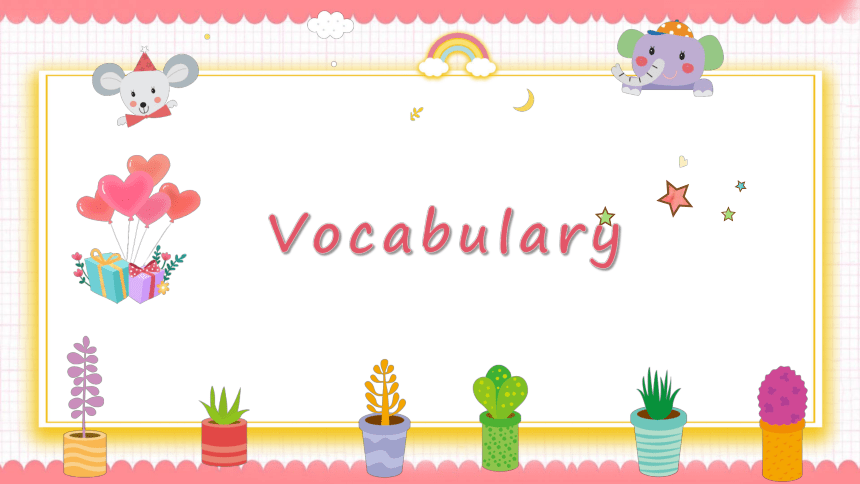
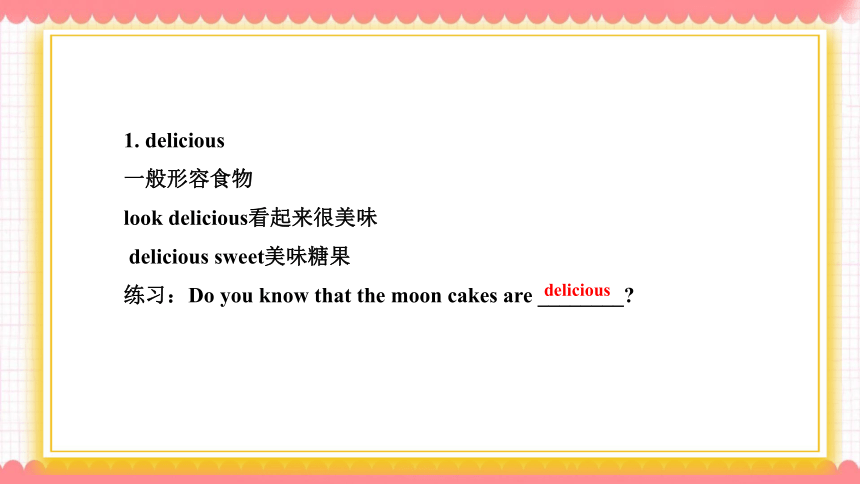
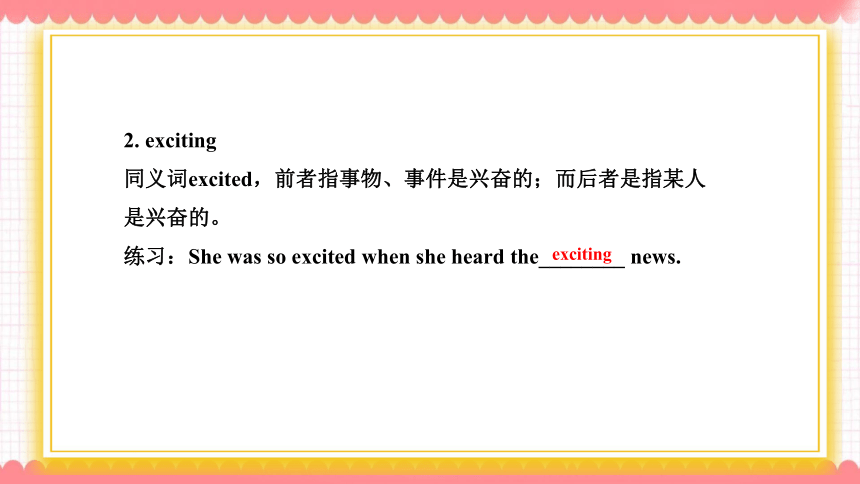
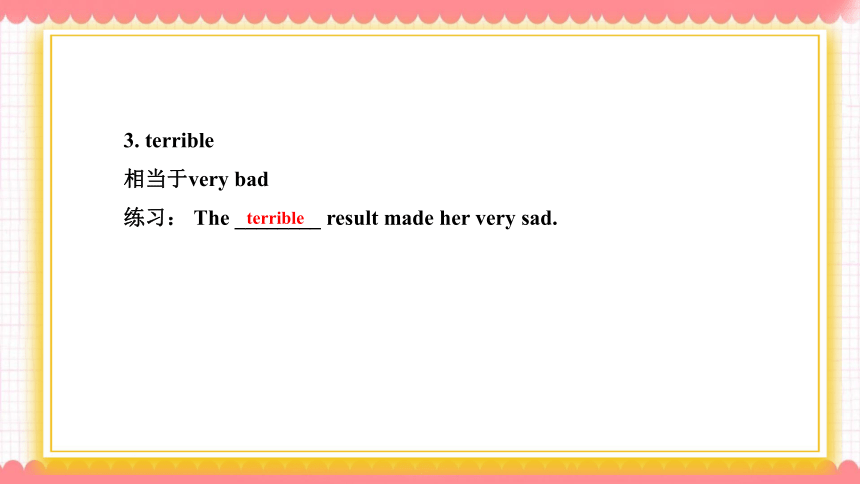
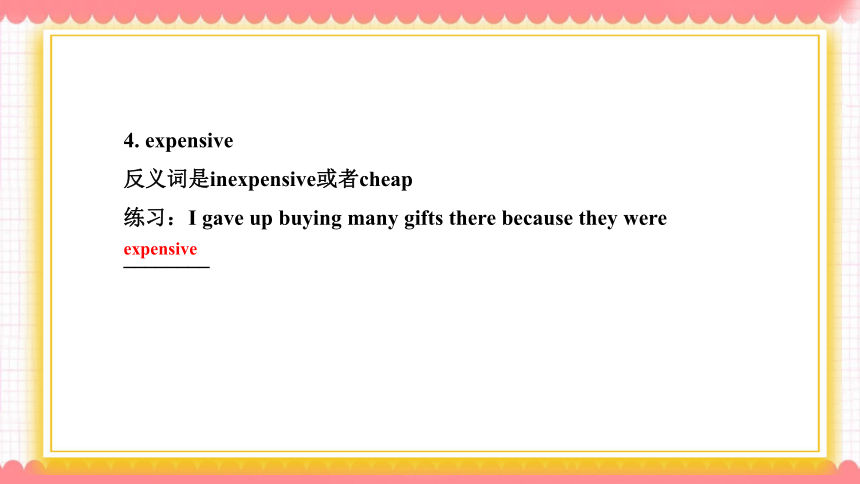
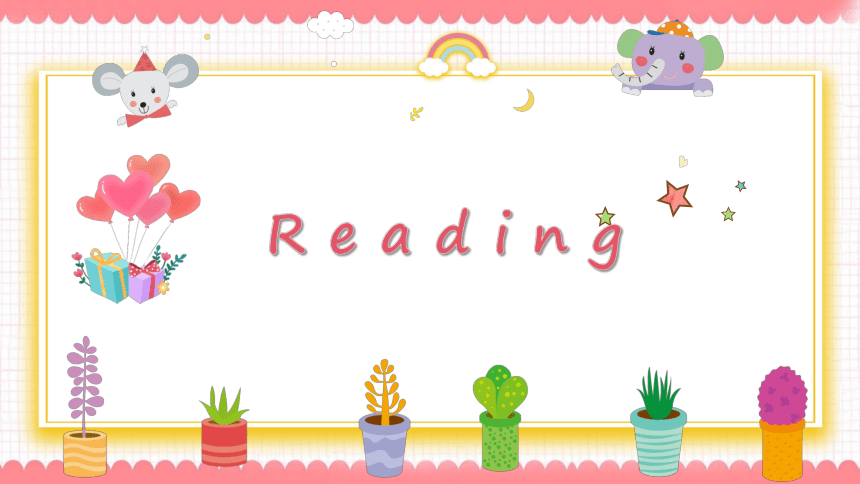
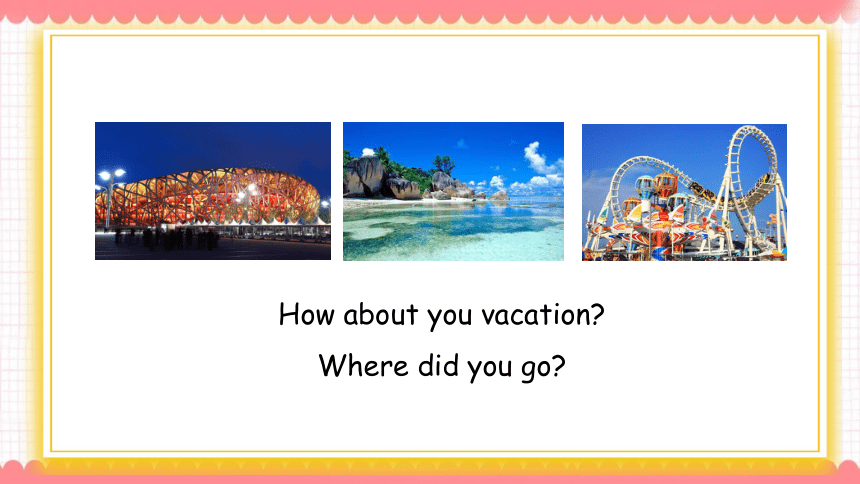
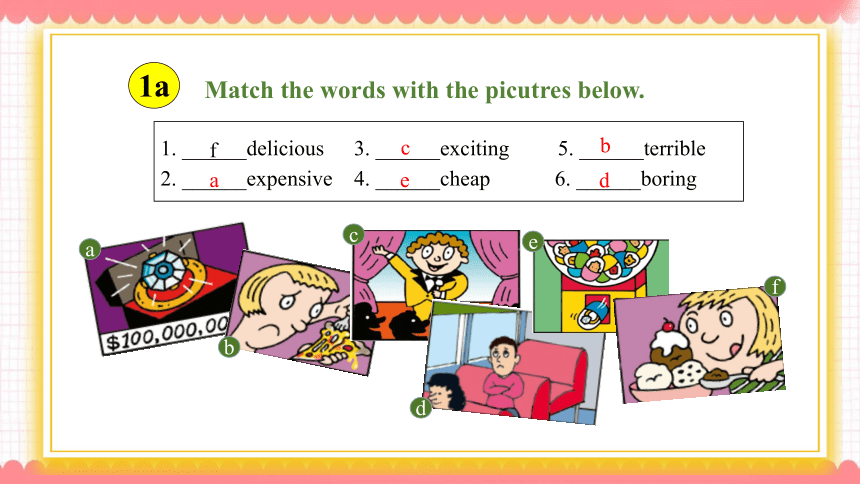
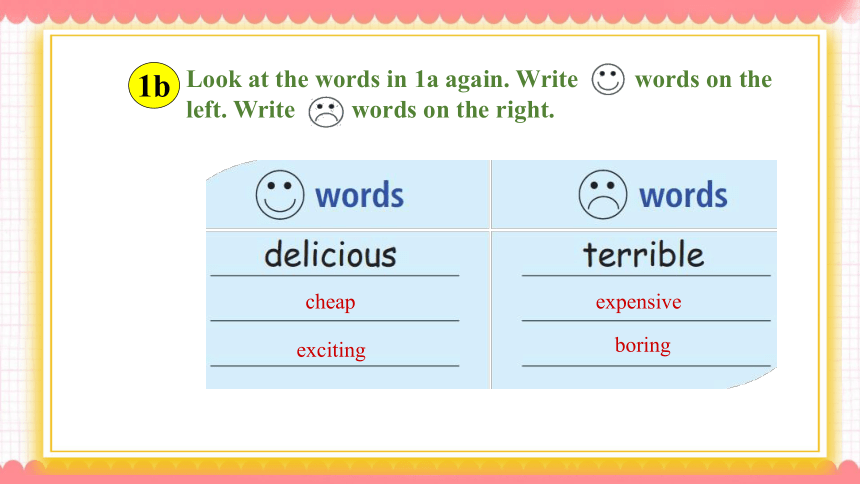
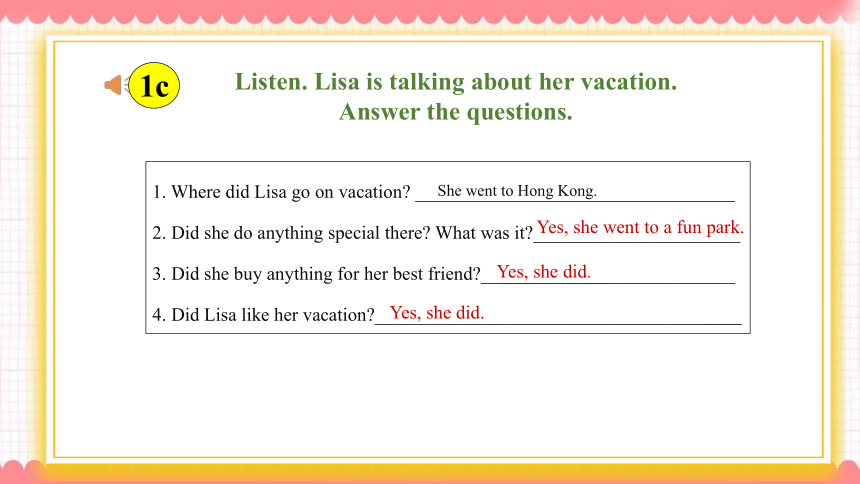
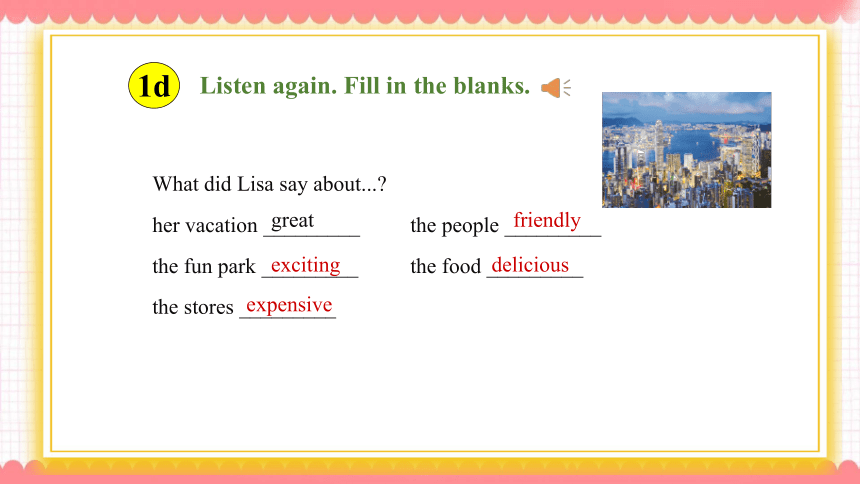
文档简介
(共31张PPT)
Unit 1
Where did you go on vacation
Section B
Vocabulary
1. delicious
一般形容食物
look delicious看起来很美味
delicious sweet美味糖果
练习:Do you know that the moon cakes are ________
delicious
2. exciting
同义词excited,前者指事物、事件是兴奋的;而后者是指某人是兴奋的。
练习:She was so excited when she heard the________ news.
exciting
3. terrible
相当于very bad
练习: The ________ result made her very sad.
terrible
4. expensive
反义词是inexpensive或者cheap
练习:I gave up buying many gifts there because they were ________
expensive
Reading
How about you vacation
Where did you go
1a
Match the words with the picutres below.
1. ______delicious 3. ______exciting 5. ______terrible
2. ______expensive 4. ______cheap 6. ______boring
a
b
c
d
e
f
f
a
c
e
b
d
1b
Look at the words in 1a again. Write words on the left. Write words on the right.
cheap
exciting
expensive
boring
1c
Listen. Lisa is talking about her vacation.
Answer the questions.
1. Where did Lisa go on vacation __________________________________
2. Did she do anything special there What was it ______________________
3. Did she buy anything for her best friend ___________________________
4. Did Lisa like her vacation _______________________________________
She went to Hong Kong.
Yes, she went to a fun park.
Yes, she did.
Yes, she did.
1d
Listen again. Fill in the blanks.
What did Lisa say about...
her vacation _________ the people _________
the fun park _________ the food _________
the stores _________
exciting
great
expensive
friendly
delicious
1e
Ask and answer questions about Lisa’s vacation. Begin your questions with:
·Where did... ·What did... ·Did she...
·How was... ·How were...
paragliding 滑翔伞运动
Did you ever try this kind of sport
2a
Discuss the questions with your partner.
1. What do people usually do on vacation
They usually ________________________
2. What activities do you find enjoyable
______________________________
______________________________
visit the museum on vacation.
Going boating, going paragliding, visiting the countryside…
2b
Read Jane’s diary entries about her vacation and answer the questions.
1. Did Jane have a good time on
Monday
__________________________
2. What about on Tuesday
________________________________________
Yes, she did.
She didn’t have a good time on Tuesday.
Explanation to the text
How did you like it 你认为它怎么样
vHow do you like... 意为“你觉得...怎么样 ”,用于询问对方的观点或看法,相当于What do you think of... 或How do you feel about... 例:How do you like your new job = What do you think of your new job 你觉得你的新工作怎么样
Explanation to the text
2. Still no one seemed to be bored. 好像仍然没有一个人感到无聊。
bored表示“感到厌倦的”,用来说明人的感受;
boring表示“令人厌烦的、无趣的”,用来说明事物的特征。
例:She is bored with her job. 她对自己的工作不感兴趣。
The lecture was deadly boring. 那讲座真是乏味极了。
以-ed结尾的形容词,通常用来修饰或者描述人,以-ing结尾的形容词,通常用来修饰或者描述物。
类似的形容词还有:interested/ interesting;excited exciting;surprised surprising。
Explanation to the text
2c
Read Jane's diary entries again. Fill in the chart.
Things Jane did or saw
tried paragliding
Did she like it (Yes/No)
Why or why not
They were delicious.
walked around Georgetown.
ate Malaysian yellow noodles
Yes
Yes
Yes
She liked the old buildings there and wondered what life was in the past.
It was exciting.
2c
Read Jane's diary entries again. Fill in the chart.
Things Jane did or saw
Did she like it (Yes/No)
Why or why not
went to Penang Hill
had one bowl of rice and some fish
No
Yes
There were many people and they waited over an hour for the train. It was raining and they didn’t have an umbrella. So they got wet and cold. They couldn’t see anything because of the bad weather. They didn’t have enough money for food.
It tasted great because she was hungry.
2d
Complete the conversation about Jane’s trip to Penang using the information in the diary entries.
Anna: Hi, Jane. Where did you go on vacation last week
Jane: I ______ to Penang in _________.
Anna: Who _______ you go with
Jane: I went with my _________.
Anna: What did you do
Jane: The weather was hot and _______ on Monday, so we
went __________ on the beach. Then in the afternoon,
we _____ bicycles to Georgetown.
went
Malaysia
did
family
sunny
paragliding
rode
2d
Anna: Sounds great!
Jane: Well, but the next day was not as good. My _____ and I
went to Penang Hill, but the weather _____ really bad
and rainy. We ______ a long time for the train and we
were _____ and cold because we forgot to bring an
_________.
Anna: Oh, no!
Jane: And that’s not all! We also didn’t bring __________
money, so we only had one bowl of rice and some fish.
father
was
waited
wet
umbrella
enough
Grammar
some-any- one/body 只用来指人 Someone/Somebody is crying in the next room.有人在隔壁房间哭。
thing 只用来指事物 Are you going. to buy anything 你会去买些东西吗
v 在表示请求、邀请、提建议等带有委婉语气的疑问句和希望得到对方肯定答复的疑问句以及表示反问的问句中,也可用something, someone, somebody 等复合不定代词。例:Would you like something to eat 你要吃些东西吗
v 当anything表示“任何事(物),无论任何事(物)”,anyone, anybody表示“无论谁,任何人”等意义时,它们也可以用于肯定句中。例:Anything is OK. 什么都行
② 含some-和any-的复合不定代词的用法区别
③ 复合不定代词的数v复合不定代词都具有单数的含义,当它们充当句子的主语时,其后的谓语动词用单数形式。例:Is everyone here today 今天每个人都到了吗 Nothing is difficult if you put your heart into it. 世上无难事,只怕有心人。
④ 复合不定代词的定语需后置,即放在复合不定代词的后面。例:Can you tell something interesting 你能讲些有趣的事情吗
含be动词 主语+was/ were+表语 They were very happy. 他们很开心。
There be句型 There was/ were+主语+地点状语 There was a farm near here two years ago.两年前这儿附近有一个农场。
含行为动词 主语+行为动词的过去式+其他 The students went to the farm yesterday.昨天学生们去农场了。
(2)一般过去时
① 一般过去时的用法一般过去时用来描述过去发生的动作或存在的状态。常和一般过去时搭配的标志性的时间状语有yesterday, last week, in the past等。例:They stayed at home yesterday. 昨天他们待在家里。
② 一般过去时的三种句式结构:
肯定句 主语+was/were+表语 We were at home yesterday. 昨天我们在家。
否定句 主语+wasn’t/weren’t+表语 We weren’t at home yesterday. 昨天我们不在家。
一般疑问句 Was/Were+主语+表语? Were you at home yesterday 昨天你们在家吗
肯定答语 Yes,主语+was/were. —Yes, we were. 是的,我们在家。
否定答语 No,主语+ wasn’t/ weren’t. —No, we weren’t. 不,我们不在家。
③ 一般过去时的句式变化be动词的一般过去时的句式变化
肯定句 主语+动词的过去式+其他. We went to the museum last week. 上周我们去博物馆了。
否定句 主语+didn't+动词原形+其他. We didn’t go to the museum last week. 上周我们没有去博物馆。
一般疑问句 Did+主语+动词原形+其他 Did you go to the museum last week 上周你们去博物馆了吗
肯定答语 Yes, 主语+did. —Yes, we did. 是的,我们去了。
否定答语 No, 主语+didn't. —No, we didn’t. 不,我们没有去。
行为动词的一般过去时的句式变化
标题内容
Preface Introduction
构成规则 举例
一般情况下动词原形末尾加-ed help—helped
结尾是e的动词加-d Live—lived
以重读闭音节结尾,且末尾只有一个辅音字母的动词,先双写这个辅音字母,再加-ed stop—stoppedplan—planned
结尾是“辅音字母+y”的动词,先变y为i再加-ed carry—carried;study—studied
④ 动词的过去式的变化规律包括规则变化和不规则变化两种。
规则变化通常以-ed结尾。具体如下:
Unit 1
Where did you go on vacation
Section B
Vocabulary
1. delicious
一般形容食物
look delicious看起来很美味
delicious sweet美味糖果
练习:Do you know that the moon cakes are ________
delicious
2. exciting
同义词excited,前者指事物、事件是兴奋的;而后者是指某人是兴奋的。
练习:She was so excited when she heard the________ news.
exciting
3. terrible
相当于very bad
练习: The ________ result made her very sad.
terrible
4. expensive
反义词是inexpensive或者cheap
练习:I gave up buying many gifts there because they were ________
expensive
Reading
How about you vacation
Where did you go
1a
Match the words with the picutres below.
1. ______delicious 3. ______exciting 5. ______terrible
2. ______expensive 4. ______cheap 6. ______boring
a
b
c
d
e
f
f
a
c
e
b
d
1b
Look at the words in 1a again. Write words on the left. Write words on the right.
cheap
exciting
expensive
boring
1c
Listen. Lisa is talking about her vacation.
Answer the questions.
1. Where did Lisa go on vacation __________________________________
2. Did she do anything special there What was it ______________________
3. Did she buy anything for her best friend ___________________________
4. Did Lisa like her vacation _______________________________________
She went to Hong Kong.
Yes, she went to a fun park.
Yes, she did.
Yes, she did.
1d
Listen again. Fill in the blanks.
What did Lisa say about...
her vacation _________ the people _________
the fun park _________ the food _________
the stores _________
exciting
great
expensive
friendly
delicious
1e
Ask and answer questions about Lisa’s vacation. Begin your questions with:
·Where did... ·What did... ·Did she...
·How was... ·How were...
paragliding 滑翔伞运动
Did you ever try this kind of sport
2a
Discuss the questions with your partner.
1. What do people usually do on vacation
They usually ________________________
2. What activities do you find enjoyable
______________________________
______________________________
visit the museum on vacation.
Going boating, going paragliding, visiting the countryside…
2b
Read Jane’s diary entries about her vacation and answer the questions.
1. Did Jane have a good time on
Monday
__________________________
2. What about on Tuesday
________________________________________
Yes, she did.
She didn’t have a good time on Tuesday.
Explanation to the text
How did you like it 你认为它怎么样
vHow do you like... 意为“你觉得...怎么样 ”,用于询问对方的观点或看法,相当于What do you think of... 或How do you feel about... 例:How do you like your new job = What do you think of your new job 你觉得你的新工作怎么样
Explanation to the text
2. Still no one seemed to be bored. 好像仍然没有一个人感到无聊。
bored表示“感到厌倦的”,用来说明人的感受;
boring表示“令人厌烦的、无趣的”,用来说明事物的特征。
例:She is bored with her job. 她对自己的工作不感兴趣。
The lecture was deadly boring. 那讲座真是乏味极了。
以-ed结尾的形容词,通常用来修饰或者描述人,以-ing结尾的形容词,通常用来修饰或者描述物。
类似的形容词还有:interested/ interesting;excited exciting;surprised surprising。
Explanation to the text
2c
Read Jane's diary entries again. Fill in the chart.
Things Jane did or saw
tried paragliding
Did she like it (Yes/No)
Why or why not
They were delicious.
walked around Georgetown.
ate Malaysian yellow noodles
Yes
Yes
Yes
She liked the old buildings there and wondered what life was in the past.
It was exciting.
2c
Read Jane's diary entries again. Fill in the chart.
Things Jane did or saw
Did she like it (Yes/No)
Why or why not
went to Penang Hill
had one bowl of rice and some fish
No
Yes
There were many people and they waited over an hour for the train. It was raining and they didn’t have an umbrella. So they got wet and cold. They couldn’t see anything because of the bad weather. They didn’t have enough money for food.
It tasted great because she was hungry.
2d
Complete the conversation about Jane’s trip to Penang using the information in the diary entries.
Anna: Hi, Jane. Where did you go on vacation last week
Jane: I ______ to Penang in _________.
Anna: Who _______ you go with
Jane: I went with my _________.
Anna: What did you do
Jane: The weather was hot and _______ on Monday, so we
went __________ on the beach. Then in the afternoon,
we _____ bicycles to Georgetown.
went
Malaysia
did
family
sunny
paragliding
rode
2d
Anna: Sounds great!
Jane: Well, but the next day was not as good. My _____ and I
went to Penang Hill, but the weather _____ really bad
and rainy. We ______ a long time for the train and we
were _____ and cold because we forgot to bring an
_________.
Anna: Oh, no!
Jane: And that’s not all! We also didn’t bring __________
money, so we only had one bowl of rice and some fish.
father
was
waited
wet
umbrella
enough
Grammar
some-any- one/body 只用来指人 Someone/Somebody is crying in the next room.有人在隔壁房间哭。
thing 只用来指事物 Are you going. to buy anything 你会去买些东西吗
v 在表示请求、邀请、提建议等带有委婉语气的疑问句和希望得到对方肯定答复的疑问句以及表示反问的问句中,也可用something, someone, somebody 等复合不定代词。例:Would you like something to eat 你要吃些东西吗
v 当anything表示“任何事(物),无论任何事(物)”,anyone, anybody表示“无论谁,任何人”等意义时,它们也可以用于肯定句中。例:Anything is OK. 什么都行
② 含some-和any-的复合不定代词的用法区别
③ 复合不定代词的数v复合不定代词都具有单数的含义,当它们充当句子的主语时,其后的谓语动词用单数形式。例:Is everyone here today 今天每个人都到了吗 Nothing is difficult if you put your heart into it. 世上无难事,只怕有心人。
④ 复合不定代词的定语需后置,即放在复合不定代词的后面。例:Can you tell something interesting 你能讲些有趣的事情吗
含be动词 主语+was/ were+表语 They were very happy. 他们很开心。
There be句型 There was/ were+主语+地点状语 There was a farm near here two years ago.两年前这儿附近有一个农场。
含行为动词 主语+行为动词的过去式+其他 The students went to the farm yesterday.昨天学生们去农场了。
(2)一般过去时
① 一般过去时的用法一般过去时用来描述过去发生的动作或存在的状态。常和一般过去时搭配的标志性的时间状语有yesterday, last week, in the past等。例:They stayed at home yesterday. 昨天他们待在家里。
② 一般过去时的三种句式结构:
肯定句 主语+was/were+表语 We were at home yesterday. 昨天我们在家。
否定句 主语+wasn’t/weren’t+表语 We weren’t at home yesterday. 昨天我们不在家。
一般疑问句 Was/Were+主语+表语? Were you at home yesterday 昨天你们在家吗
肯定答语 Yes,主语+was/were. —Yes, we were. 是的,我们在家。
否定答语 No,主语+ wasn’t/ weren’t. —No, we weren’t. 不,我们不在家。
③ 一般过去时的句式变化be动词的一般过去时的句式变化
肯定句 主语+动词的过去式+其他. We went to the museum last week. 上周我们去博物馆了。
否定句 主语+didn't+动词原形+其他. We didn’t go to the museum last week. 上周我们没有去博物馆。
一般疑问句 Did+主语+动词原形+其他 Did you go to the museum last week 上周你们去博物馆了吗
肯定答语 Yes, 主语+did. —Yes, we did. 是的,我们去了。
否定答语 No, 主语+didn't. —No, we didn’t. 不,我们没有去。
行为动词的一般过去时的句式变化
标题内容
Preface Introduction
构成规则 举例
一般情况下动词原形末尾加-ed help—helped
结尾是e的动词加-d Live—lived
以重读闭音节结尾,且末尾只有一个辅音字母的动词,先双写这个辅音字母,再加-ed stop—stoppedplan—planned
结尾是“辅音字母+y”的动词,先变y为i再加-ed carry—carried;study—studied
④ 动词的过去式的变化规律包括规则变化和不规则变化两种。
规则变化通常以-ed结尾。具体如下:
同课章节目录
- Unit 1 Where did you go on vacation?
- Section A
- Section B
- Unit 2 How often do you exercise?
- Section A
- Section B
- Unit 3 I'm more outgoing than my sister.
- Section A
- Section B
- Unit 4 What's the best movie theater?
- Section A
- Section B
- Unit 5 Do you want to watch a game show?
- Section A
- Section B
- Unit 6 I'm going to study computer science.
- Section A
- Section B
- Unit 7 Will people have robots?
- Section A
- Section B
- Unit 8 How do you make a banana milk shake?
- Section A
- Section B
- Unit 9 Can you come to my party?
- Section A
- Section B
- Unit 10 If you go to the party, you'll have a grea
- Section A
- Section B
